Tuesday, Oct. 25 was a big day for the long-awaited Chaffee Housing Trust (CHT) project at West 3rd and M Streets in Salida. The site will soon provide six units of affordable housing of varying sizes, types, and price ranges with some for sale and others for rent.
“Our mission focuses on providing responsible community development by providing affordable and sustainable homeownership and rentals to qualifying residents,” said CHT Executive Director Read McCulloch.
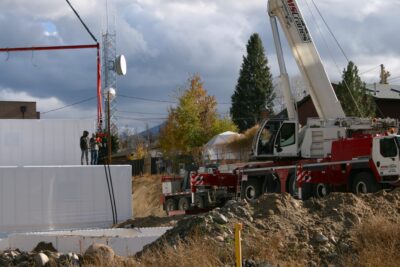
A Liebherr all-terrain crane provided by RMS Cranes in Colorado Springs. Operator Josh handles the boom while his partner communicates via walkie-talkie and guides the unit into place by hand. Merrell Bergin photo
A massive Liebherr, all-terrain crane from RMS Cranes in Colorado Springs, with a 196-foot boom (and a reputed $2 million price tag) lumbered down the dirt track at the back of the property. It was soon followed by multiple flatbed semi-trailers each carrying a housing module.
The modules are manufactured in Pueblo, Colorado and each is manufactured specifically for each site. Yet due to lane restrictions on U.S. 50 (as well as narrow canyon curves, they had to take the long way around via La Veta, Alamosa and down Poncha Pass.
RMS Cranes offloads IndieDwell modular housing unit on Oct. 26, 2022 for Chaffee Housing Trust in Salida. Merrell Bergin video
RMS Crane operators gingerly dock an IndieDwell modular housing unit for the Chaffee Housing Trust project at West 3rd and M Streets in Salida, CO. Merrell Bergin video
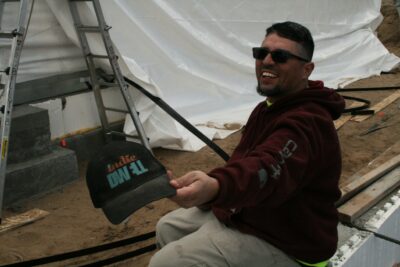
Alonzo Hernandez, an exterior specialist from IndieDwell.
Ark Valley Voice caught up with the crews after a few of the modules of the largest (three-bedroom) units were in place. While waiting for the RMS Crane crew to rig the next module, Alonzo Hernandez allowed Ark Valley Voice a sneak peak at each of the rooms inside.
Hernandez is an exterior specialist with IndieDwell, a large manufacturer of modular homes with headquarters in Boise, ID and plants in Pueblo, Colorado, California and Virginia. After consulting with his teammates Leo and Billy on the details, Hernandez explained that the homes pass through at least 15 stages or “stops” of construction.
The Process and What’s Inside Each Home
The process starts with a base, then framing, and walls. The exoskeleton of each unit is made from cold-formed steel. IndieDwell units are insulated using rigid EPS and Polyiso Foam in the walls and EPS and Fiberglass in the ceilings. Electrical follows then plumbing. Textured drywall comes next, followed by concrete siding added at the end.
Hernandez says their team has enjoyed working on the CHT River Ridge project in Salida. They have done work in Pagosa Springs, Archuleta County, and have upcoming projects in Fairplay and elsewhere on the Front Range.
According to the IndieDwell website, their builds come fully outfitted with all interior fittings, such as plumbing, electrical, closets, and appliances. The units are all plumbed for a washer and dryer.
Included in each home are a high-performance mini-split heat pump and air conditioner, providing both heating and cooling through a single device. These energy-efficient units transfer heat instead of generating it and use more sophisticated cooling compressors and fans which significantly cut down on energy costs compared to conventional systems.
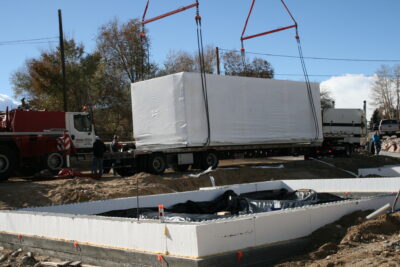
RMS Cranes team prepares to hoist modular housing unit onto foundation at Chaffee Housing Trust site, West 3rd and M Streets in Salida. Merrell Bergin photo
To maintain a healthy indoor environment, an energy recovery ventilator is part of the system It’s a special unit that helps to maintain indoor air quality by bringing in fresh air through a HEPA filter and pumping out stale air.
Each home has 15 energy efficiency and sustainability features in keeping with the manufacturer’s mission statement and building principles.
These homes are 100 percent electric and are “net-zero ready”. This means that solar panels could easily be added, aligning with the latest direction of renewable energy sources and eliminating fossil fuels such as natural gas. The CHT is working on new financing options to help install solar panels for this project.
Using the federal Inflation Reduction Act, 30 percent of PV (solar electric) install costs for nonprofit housing can be offset with a grant. This would allow CHT to fix (reduce) utility payments, removing an ongoing burden on the owners. If the IRA program works out, the CHT says they could use this on all their future projects, as well as retrofit past projects (Old Stage Road, River Ridge).
Goals of this Chaffee Housing Trust Development Project
Building on the success of their recently opened River Ridge (an eight-unit condominium development), the Chaffee Housing Trust (CHT) sought to apply lessons learned and create six unique units of affordable housing within blocks of downtown Salida.
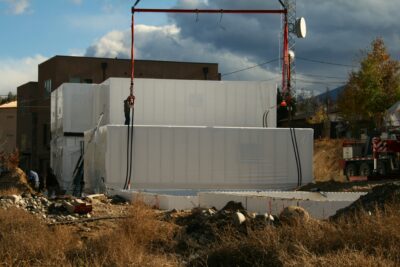
Modular housing unit set on the foundation for Chaffee Housing Trust project at West 3rd and M Streets in Salida. Merrell Bergin photo
In a conversation on Wednesday at the building site with McCulloch, the West 3rd and M Street project aims to check off multiple boxes on the “community need list” for affordable housing. In the mix of this project are units that address the size of different households and a range of price points.
McCulloch explained that it is, on “a very small scale, [a demonstration] of meeting the needs.” He added, “There’s a variety of needs out there, all the way from a small, starter home to a larger unit.”
McCulloch points out that while the definition of “affordable” and the qualifying standards of Area Mean Income (AMI) are relative (and increase annually) that their units offer “up to 100 percent financing – no money down,” which is otherwise a huge barrier for most buyers.
Accessibility is another goal of this project. In addition to having one unit designed as accessible for an audio and visually impaired resident, McCulloch said that another unit, a one-bedroom one-bath, 564 square foot home is fully wheelchair accessible and now slated for an elderly veteran. To make this happen, the CHT partnered with Colorado Habitat for Humanity to package additional incentives to lower the home’s cost even further. This represents just one example of the work that CHT does to leverage every available dollar.
In addition to development projects and land banking, the CHT offers a range of services to help potential home buyers. They provide financial education and housing counseling to help with home buyer readiness, including guidance on cleaning up a credit rating and getting through the mortgage process.
Next Steps
While the modules may look like white-shrouded boxes at the moment, soon they will turn into finished homes. After placing each module, it must be welded onto steel plates affixed to the corners of the foundation. Steel columns are also placed running down the middle of the foundation, supporting the structure.
Next, the exterior siding and roofing need to be installed and services connected. McCulloch says the CHT has all the for-sale homes under contract except for one of the three-bedroom units.
Buyers currently have mortgage eligibility approval with the USDA and are awaiting completion for final mortgage approval.
The CHT hopes to obtain a Certificate of Occupancy (CO) in January with closing and move-in soon thereafter.
To those who say that “nothing is happening with affordable housing in Salida”, this project is one example of a multi-year effort to welcome six families into homes in a desirable, walkable neighborhood. Many obstacles were overcome by the CHT, from acquiring city-owned land to rezoning, realigning M Street, and building new utility lines, all done during the pandemic, amidst rampant inflation in building costs.
There’s more work to be done for sure to get ahold of what is now recognized as a full-blown housing crisis. This project hopes to inspire more of the creative solutions needed to help tame it.
IndieDwell: “Building high quality, sustainable, healthy homes for underserved communities”
IndieDwell is a Certified “B Corp” and Good Well Certified as a Fair, Equitable and Humane Workplace, making them a good fit to align with the mission of the Chaffee Housing Trust.
As a B Corp, IndieDwell says they exist to “transform the status quo by creating a socially conscious business model that enhances the well-being of humanity in order to inspire others.” B Corp entities seek to meet the highest levels of social and environmental responsibility. This goes beyond the traditional goal of maximizing profits for shareholders and includes treating employees as a critical asset.
According to their website, “IndieDwell is a Public Benefit Corporation committed to a safe, inclusive, diverse and equitable workplace.” Teammates are also owners and share in the profits of the business.
The IndieDwell mission is to “Revolutionize the building industry by producing dwellings that provide better occupant health and well-being, improve the health of the environment and empower community.
Featured image: IndieDwell modular housing units being placed by RMS Cranes team at West 3rd and M Streets, Salida. Merrell Bergin photo


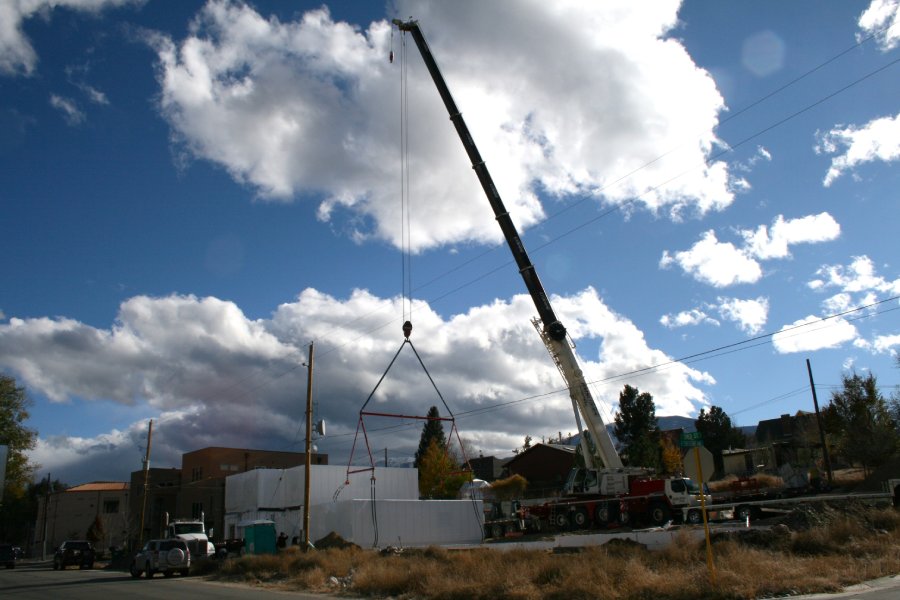




Thank you, Merrell, for these interesting videos that many of us would otherwise never get to see.